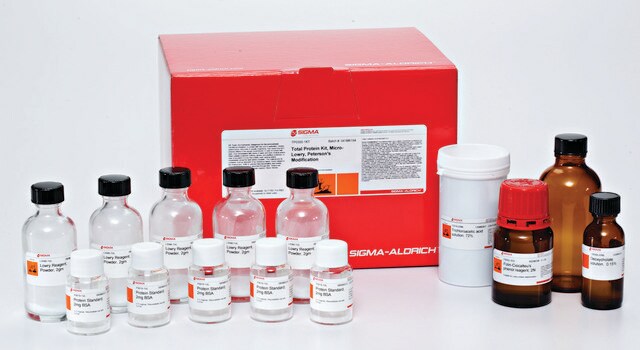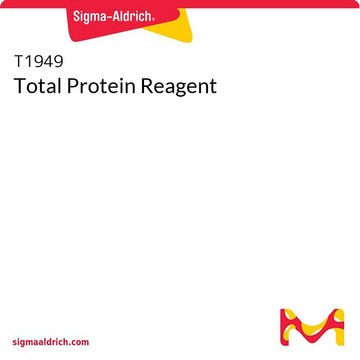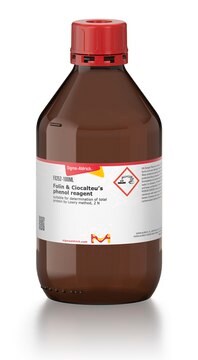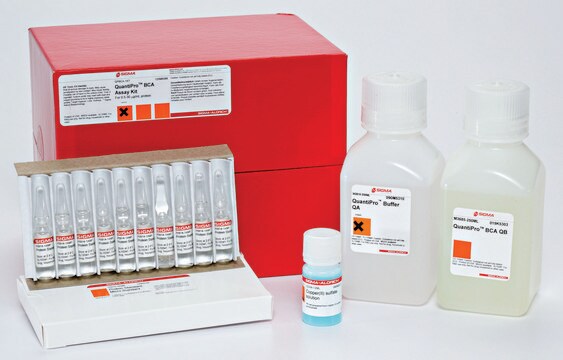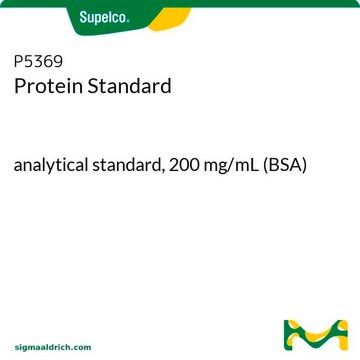TP0200
Total Protein Kit, Micro-Lowry, Onishi & Barr Modification
sufficient for ~50 manual assays
Synonym(s):
Total Protein Assay Kit
Sign Into View Organizational & Contract Pricing
All Photos(1)
About This Item
UNSPSC Code:
12352202
NACRES:
NA.32
Recommended Products
description
wavelength 500-750nm
usage
sufficient for ~50 manual assays
protein detection level measuring range
0-1 mg/mL
parameter
18-26 °C temperature
200 μL sample volume
storage temp.
2-8°C
General description
The biuret and Lowry procedures are used for protein determination. The former is widely used for clinical assays. The latter, though more sensitive, is used for investigative work and is limited by poor stability of combined reagents, non-reproducibility of color, especially at low protein concentration, and nonlinear chromogenic response with protein concentration. Ohnishi and Barr modified the biuret reagent for the Lowry procedure, thereby simplifying it while improving the stability of the combined reagent.
Application
Total Protein Kit, Micro-Lowry, Onishi & Barr Modification has been used to determine total soluble protein concentrations:
- in the dialyzates/extracts of gliadins
- in the extracts of flour (Avena sativa and Triticum durum) and seeds (Chenopodium quinoa, Salvia hispanica L.)
- in the stored samples of rat liver microsomal fractions
Principle
Colorimetric, Endpoint.assay. Ohnishi and Barr′s modification of micro Lowry method. According to procedure, dilute biuret reagent reacts with peptide bonds to yield a purple-blue complex, the color of which is intensified by the addition of phenol reagent. Absorbance, read at 550-750 nm, is used to determine results from a standard curve.
Kit Components Also Available Separately
Product No.
Description
SDS
- B3934Biuret reagent, protein detection level 150-1,000 μg/mL 110 mLSDS
- Folin & Ciocalteu’s phenol reagent 5 mL
required but not provided
Product No.
Description
Pricing
Signal Word
Danger
Hazard Statements
Precautionary Statements
Hazard Classifications
Eye Dam. 1 - Met. Corr. 1 - Skin Corr. 1
Storage Class Code
8A - Combustible corrosive hazardous materials
Flash Point(F)
Not applicable
Flash Point(C)
Not applicable
Choose from one of the most recent versions:
Already Own This Product?
Find documentation for the products that you have recently purchased in the Document Library.
Customers Also Viewed
Inge Everaert et al.
American journal of physiology. Renal physiology, 318(4), F1030-F1040 (2020-03-10)
Manipulation of circulating histidine-containing dipeptides (HCD) has been shown to affect the development of diabetes and early-stage diabetic nephropathy (DN). The aim of the present study was to investigate whether such interventions, which potentially alter levels of circulating HCD, also
A Kaliszewska et al.
Food and chemical toxicology : an international journal published for the British Industrial Biological Research Association, 95, 89-95 (2016-07-06)
Cereal proteins are of clinical interest because of their cytotoxic and immunogenic features being associated to allergic processes and intestinal disorders. In addition to gliadins, there has been suggested an important role for non-gluten modulating factors (nGMF) on the onset
Fei-Fan Cai et al.
Journal of biomedical materials research. Part B, Applied biomaterials, 109(8), 1090-1104 (2020-12-06)
The concept of adding inorganic fillers into hydrogels to form hydrogel nanocomposites often provides advantageous properties which can be exploited for successful 3D biofabrication. In this study, a new composite hydrogel combining oxidized alginate-gelatin (ADA-GEL) hydrogel and Laponite® nanoclay as
Method for Detecting NADPH-Cytochrome P450 Reductase in Liver Microsomal Fractions by Using Native Polyacrylamide Gel Electrophoresis and NADPH-Diaphorase Staining
Yokoyama H, et al.
American Journal of Analytical Chemistry (2013)
A Smialowska et al.
Journal of dairy science, 100(4), 2553-2563 (2017-02-22)
We isolated goat phosphopeptides via calcium and ethanol precipitation from a caseinate digest and investigated their feasibility as an iron-fortification ingredient in nutritional foods. Goat tryptic-digested phosphopeptides could bind 54.37 ± 0.50 mg of Fe/g of protein compared with goat
Our team of scientists has experience in all areas of research including Life Science, Material Science, Chemical Synthesis, Chromatography, Analytical and many others.
Contact Technical Service